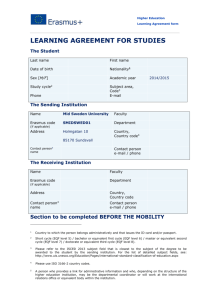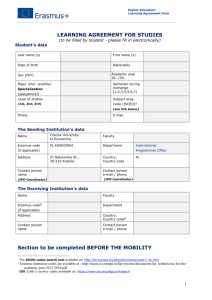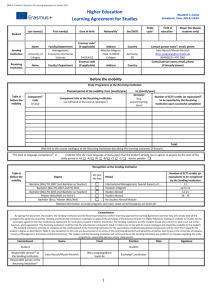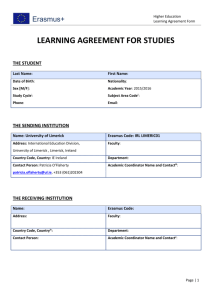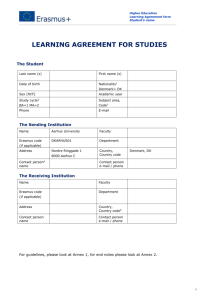CHANGES TO LEARNING AGREEMENT (during mobility)
advertisement
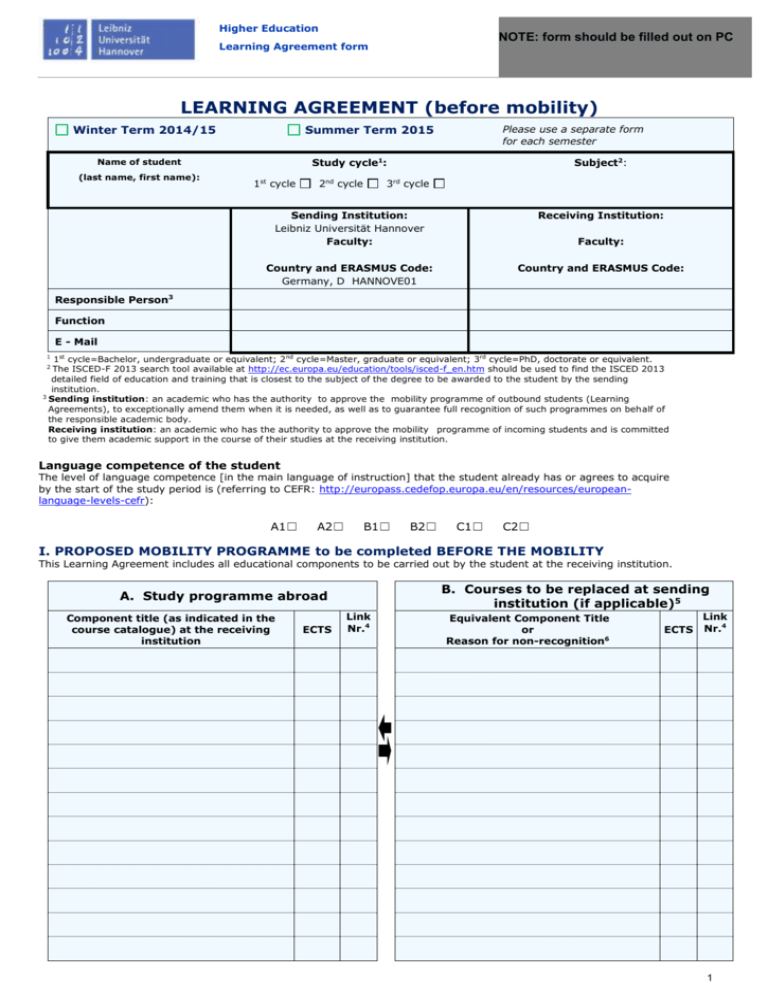
Higher Education NOTE: form should be filled out on PC Learning Agreement form LEARNING AGREEMENT (before mobility) Winter Term 2014/15 Summer Term 2015 Study cycle1: Name of student (last name, first name): Please use a separate form for each semester 1st cycle 2nd cycle Subject2: 3rd cycle Sending Institution: Leibniz Universität Hannover Faculty: Receiving Institution: Country and ERASMUS Code: Germany, D HANNOVE01 Country and ERASMUS Code: Faculty: Responsible Person3 Function E - Mail 1 1st cycle=Bachelor, undergraduate or equivalent; 2 nd cycle=Master, graduate or equivalent; 3rd cycle=PhD, doctorate or equivalent. 2 The ISCED-F 2013 search tool available at http://ec.europa.eu/education/tools/isced-f_en.htm should be used to find the ISCED 2013 detailed field of education and training that is closest to the subject of the degree to be awarded to the student by the sending institution. 3 Sending institution: an academic who has the authority to approve the mobility programme of outbound students (Learning Agreements), to exceptionally amend them when it is needed, as well as to guarantee full recognition of such programmes on behalf of the responsible academic body. Receiving institution: an academic who has the authority to approve the mobility programme of incoming students and is committed to give them academic support in the course of their studies at the receiving institution. Language competence of the student The level of language competence [in the main language of instruction] that the student already has or agrees to acquire by the start of the study period is (referring to CEFR: http://europass.cedefop.europa.eu/en/resources/europeanlanguage-levels-cefr): A1☐ A2☐ B1☐ B2☐ C1☐ C2☐ I. PROPOSED MOBILITY PROGRAMME to be completed BEFORE THE MOBILITY This Learning Agreement includes all educational components to be carried out by the student at the receiving institution. B. Courses to be replaced at sending institution (if applicable)5 A. Study programme abroad Component title (as indicated in the course catalogue) at the receiving institution ECTS Link Nr.4 Equivalent Component Title or Reason for non-recognition6 ECTS Link Nr.4 1 Higher Education NOTE: form should be filled out on PC Learning Agreement form Total of ECTS Credits: Total of ECTS Credits: 4 Please use the link numbers in each line to link the courses that are equivalent to each other. 5 There needs to be no one to one correspondence between the courses followed abroad and the ones replaced at the sending institutions. For further information please look at the annex of the learning agreement. 6 Acceptable reasons for non-recognition: a) Student does not want to recognize the course. b) Responsible person can prove that the qualification to be achieved is substantially different. II. COMMITMENT OF THE THREE PARTIES By signing this document, the student, the sending institution and the receiving institution confirm that they approve the proposed Learning Agreement and that they will comply with all the arrangements agreed by all parties. Sending and receiving institutions undertake to apply all the principles of the Erasmus Charter for Higher Education relating to mobility for studies (or the principles agreed in the inter-institutional agreement for institutions located in partner countries). The receiving institution confirms that the educational components listed in Table A are in line with its course catalogue. The sending institution commits to recognise all the credits gained at the receiving institution for successfully completed educational components and to count them towards the student’s degree as described in Table B. Any exceptions to this rule are documented in an annex of this Learning Agreement and agreed by all parties. The student and receiving institution will communicate to the sending institution any problems or changes regarding the proposed mobility programme, responsible persons and/or study period. In all cases, the student will report via the on-line EU survey on the full recognition by the sending institution of his/her credits achieved abroad based on what has been agreed in Table B (or table B in case of changes during the mobility) and its possible annexes. All parties must sign the document; however, it is not compulsory to circulate papers with original signatures, scanned copies of signatures or digital signatures may be accepted, depending on the national legislation. 7 1. Student 2. Responsible person at Sending Institution7 3. Responsible person at Receiving Institution7 Date:______________ Date:______________ Date:______________ ___________________ Signature ___________________ Signature and stamp ___________________ Signature and stamp Sending institution: an academic who has the authority to approve the mobility programme of outbound students (Learning Agreements), to exceptionally amend them when it is needed, as well as to guarantee full recognition of such programmes on behalf of the responsible academic body. Receiving institution: an academic who has the authority to approve the mobility programme of incoming students and is committed to give them academic support in the course of their studies at the receiving institution. 2 Higher Education NOTE: form should be filled out on PC Learning Agreement form CHANGES TO LEARNING AGREEMENT (during mobility) Winter Term 2014/15 Summer Term 2015 Study cycle1: Name of student (last name, first name): Please use a separate form for each semester 1st cycle 2nd cycle Subject2: 3rd cycle Sending Institution: Leibniz Universität Hannover Country and ERASMUS Code: Germany; D HANNOVE01 Receiving Institution: Country and ERASMUS code: Responsible Person3 Function E - Mail 1 1st cycle=Bachelor, undergraduate or equivalent; 2 nd cycle=Master, graduate or equivalent; 3rd cycle=PhD, doctorate or equivalent. The ISCED-F 2013 search tool available at http://ec.europa.eu/education/tools/isced-f_en.htm should be used to find the ISCED 2013 detailed field of education and training that is closest to the subject of the degree to be awarded to the student by the sending institution. 3 Sending institution: an academic who has the authority to approve the mobility programme of outbound students (Learning Agreements), to exceptionally amend them when it is needed, as well as to guarantee full recognition of such programmes on behalf of the responsible academic body. Receiving institution: an academic who has the authority to approve the mobility programme of incoming students and is committed to give them academic support in the course of their studies at the receiving institution. 2 I. CHANGES TO THE PROPOSED MOBILITY PROGRAMME Changes should be made within one month after regular classes have started. A. Study programme abroad ECTS Link Nr.5 Equivalent Component Title or Reason for non-recognition6 ECTS Link Nr.5 A1 A1 Total of ECTS Credits: Change4 Change4 Component title (as indicated in the course catalogue) at the receiving institution B. Courses to be replaced at sending institution A1 A1 A1 A1 A1 A1 A1 A1 A1 A1 A1 A1 A1 A1 A1 A1 A1 A1 A1 A1 A1 A1 A1 A1 Total of ECTS Credits: 4 Please use the dropdown menu. Reasons for deleting a component: A1) Previously selected educational component is not available at receiving institution; A2) Component is in a different language than previously specified in the course catalogue; A3) Timetable conflict; A4) Other (please specify). Reasons for adding a component: B1) Substituting a deleted component; B2) Other (please specify). 5 Please use the link numbers in each line to link the courses that are equivalent to each other. 3 Higher Education Learning Agreement form NOTE: form should be filled out on PC 6 Acceptable Reasons for non-recognition: a) Student does not want to recognize the course. b) Responsible person can prove that the qualification to be achieved is substantially different. II. COMMITMENT OF THE THREE PARTIES By signing this document, the student, the sending institution and the receiving institution confirm that they approve the proposed Learning Agreement and that they will comply with all the arrangements agreed by all parties. Sending and receiving institutions undertake to apply all the principles of the Erasmus Charter for Higher Education relating to mobility for studies (or the principles agreed in the inter-institutional agreement for institutions located in partner countries). The receiving institution confirms that the educational components listed in Table A are in line with its course catalogue. The sending institution commits to recognise all the credits gained at the receiving institution for successfully completed educational components and to count them towards the student’s degree as described in Table B. Any exceptions to this rule are documented in an annex of this Learning Agreement and agreed by all parties. The student and receiving institution will communicate to the sending institution any problems or changes regarding the proposed mobility programme, responsible persons and/or study period. In all cases, the student will report via the on-line EU survey on the full recognition by the sending institution of his/her credits achieved abroad based on what has been agreed in Table B (or table B in case of changes during the mobility) and its possible annexes. All parties must sign the document; however, it is not compulsory to circulate papers with original signatures, scanned copies of signatures or digital signatures may be accepted, depending on the national legislation. 1. Student 2. Responsible person at Sending Institution7 3. Responsible person at Receiving Institution7 Date:______________ Date:______________ Date:______________ ___________________ Signature ___________________ Signature and stamp ___________________ Signature and stamp 7 Sending institution: an academic who has the authority to approve the mobility programme of outbound students (Learning Agreements), to exceptionally amend them when it is needed, as well as to guarantee full recognition of such programmes on behalf of the responsible academic body. Receiving institution: an academic who has the authority to approve the mobility programme of incoming students and is committed to give them academic support in the course of their studies at the receiving institution. 4
